Joe Biden, Donald Trump clashing visits thrust border fight further into spotlight
BROWNSVILLE, Texas – The long-anticipated standoff between President Joe Biden and former President Donald Trump finally happened Thursday, not on a debate stage but on two vastly different sections of the U.S.-Mexico border.
The political rivals, who are expected to face off in a rematch in the November election, staged separate visits to the southern border in Texas to draw attention to immigration and border security, now the leading issue for voters. The visits amounted to a duel in optics, if not specifics.
Biden called on Trump to join him in asking Congress to pass wide-ranging border security legislation negotiated by a team of Democratic and Republican senators, which the House GOP rejected at Trump’s urging.
“Instead of playing politics with the issue, why don’t we just get together and get it done?” Biden said from Brownsville, in Texas’ Rio Grande Valley.
Trump, speaking roughly the same time 325 miles away in Eagle Pass, showed no interest in working with Biden, or the Democrats for that matter. He hurled insults at his successor, charging that Biden is solely responsible for the immigration crisis and unable to deal with it effectively.
"This is a Joe Biden invasion," Trump said from Shelby Park, which sits on the Rio Grande and has become the epicenter of the national immigration debate. "This is a Biden invasion over the past three years. ... He's a terrible president, worst president our country's ever had probably, the most incompetent president we've ever had."
The competing stops by Biden and Trump come just eight months before the November election and as polls show Americans are deeply concerned about the situation along the border.
A Gallup Poll released this week showed that, for the first time since the last decade, Americans now believe immigration to be the most important issue facing the United States. A separate survey earlier in February by the Pew Research Center survey showed 80% of Americans believe the government is doing a bad job dealing with the large number of migrants at the border.
Yet another poll in February by the Texas Politics Project at the University of Texas showed that a majority of Texans want to see more border enforcement and support Texas Gov. Greg Abbott's border security initiatives, such as building border barriers and installing razor wire along the Rio Grande.
'We can't afford not to do this'
In Brownsville, Biden's motorcade drove a road alongside a 20-foot-high border fence, just inside the U.S.-Mexico border. The entourage drove through a gate in the fence and down a bumpy dirt road, along which parked cars were flying Trump flags.
Biden walked along a section of the border and later met with federal immigration agents, who gave him a lengthy briefing on efforts to deter illegal crossings. Brownsville was once the nation’s busiest corridor for illegal crossings, but in recent months has seen a sharp drop in the number of people entering illegally into the United States.
In his remarks at the Brownsville Border Patrol Station, Biden said officials desperately need more resources to secure the border. The legislation killed by House Republicans included funding to hire additional border patrol agents and buy additional security inspection technology and equipment.
"We can't afford not to do this," Biden said.
Before Biden's arrival, several hundred mostly Biden supporters lined up on Boca Chica Boulevard outside the city’s airport, waving blue Biden flags and chanting “Four more years!” More residents parked along the boulevard, stretching for about half a mile, waving U.S. flags and hoping to catch a glimpse of the president.
Elia Zamora-Hernandez, 71, drove 30 miles from Harlingen to show her support. Donning a Biden cap and waving a Biden flag, she said Republicans are not cooperating enough with Biden to allow him to do his job.
“The border has been a problem for years, years, years,” Zamora-Hernandez said. “This is not something he created.”
Farther down the boulevard, groups organized by La Union del Pueblo Entero, a migrants' and workers’ rights group, chanted, “Biden, escucha – ?estamos en la lucha!” (Biden, listen – we’re struggling!) and “?Si se puede!” (Yes we can!)
Victor Cavazos, a director at The Sidewalk School, a nonprofit that helps asylum-seekers in Reynosa, Mexico, said he was baffled that Biden chose not to meet with leaders of nongovernmental organizations while in Texas.
“He’s missing a big piece of the puzzle,” he said. “We know what the needs are on the ground.”
Unease in Eagle Pass: As border battle brews between Texas and U.S., tiny Eagle Pass braces for its next conflict
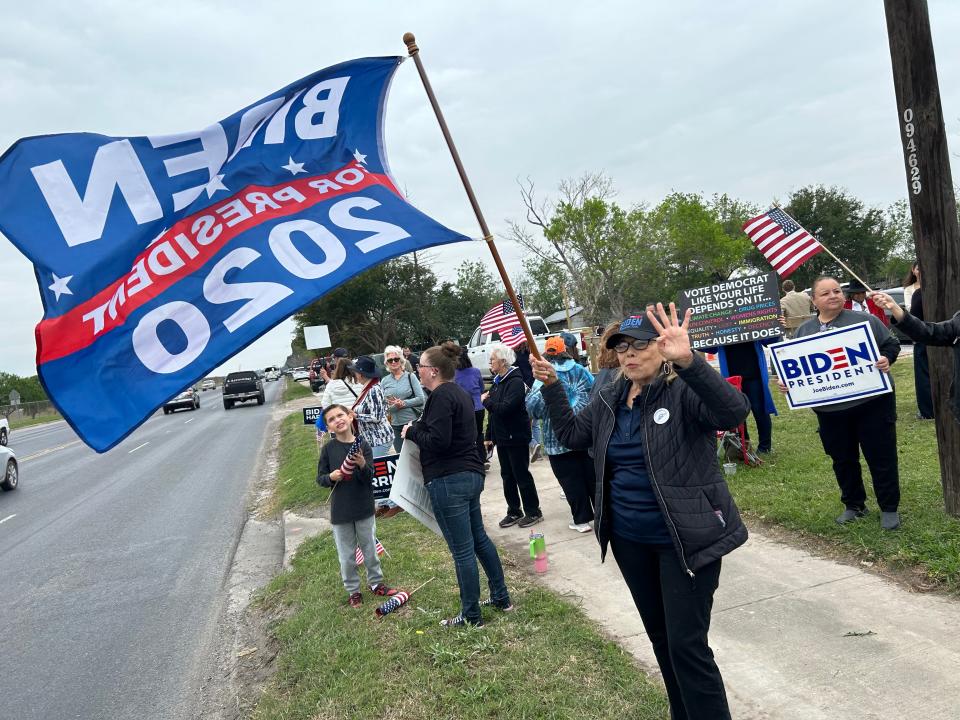
Trump travels to Eagle Pass
In Eagle Pass, Trump was joined by Abbott and Texas National Guard soldiers, who showed off the razor wire they erected along a 29-mile stretch of border upon Abbott’s orders – and in defiance of a U.S. Supreme Court order.
Speaking without notes, Trump veered from praising himself to criticizing immigration policies in Democratic-controlled California to lauding Abbott for taking a hardline approach to the border. He reprised his 2016 campaign theme that "murderers" and "rapists" were coming into the United States from Mexico.
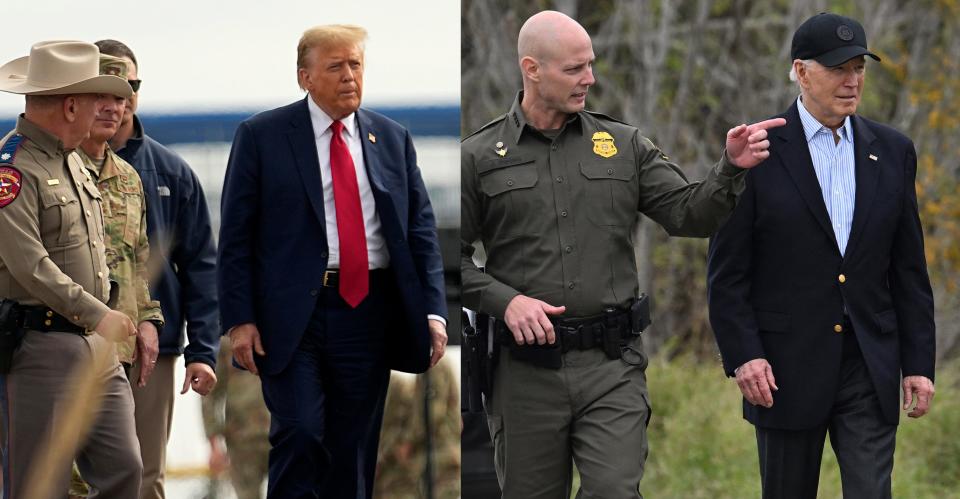
"These are the people that are coming into our country and they're coming from jails and they're coming from prisons and they're coming from mental institutions and they're coming from insane asylums," Trump said. "And they're terrorists and being let into our country."
Trump also made reference to Laken Riley, a 22-year-old nursing student who was found murdered in a wooded area at the University of Georgia in Athens last week. The man charged with the killing of the student was a migrant from Venezuela who entered the U.S. illegally.
Before Trump's arrival, city police cordoned off the streets leading down to Shelby Park. On Main Street, the four corners of the intersection with Commercial Street were filled with a mix of Trump and Biden supporters amid a collection of stores such as Claudia’s Perfuma Fina and the Cowboy Corral, which sells western wear.
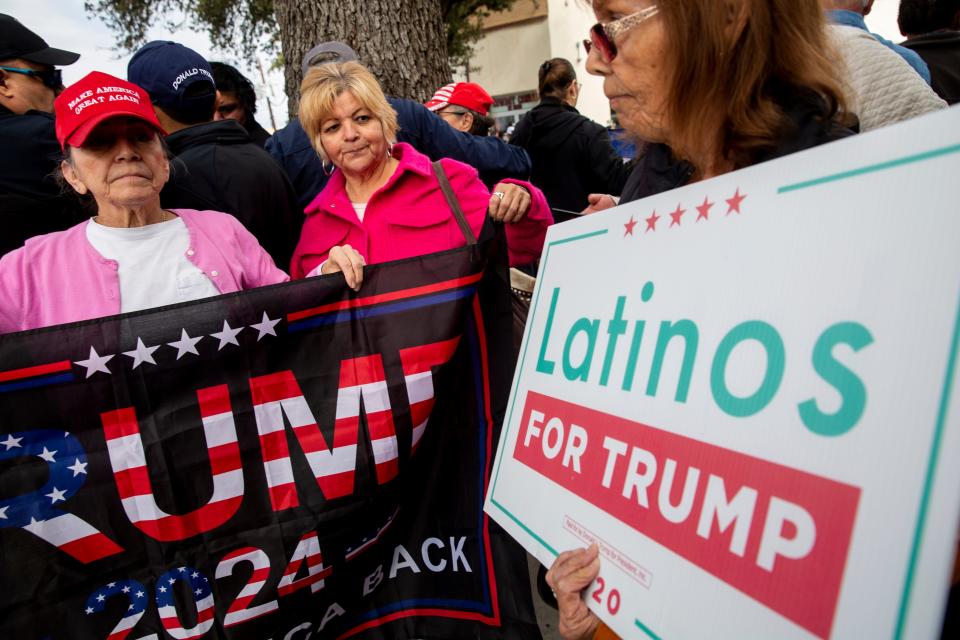
“We’ve seen two surges under two administrations, and it was better under Trump,” said Freddy Arellano, a junior at nearby Sul Ross University, who sported a Make America Great Again ball cap. “Under Biden it’s unbearable.”
At the opposite corner, Steve Fischer, who is the chief public defender for the region, called Trump’s visit and Abbott’s policies at the border “a big joke” and "political theatrics.”
Jose Hernandez, who served in the Army and wore a Vietnam veterans cap, was in the middle – figuratively and literally.
“I’m 50-50 on Biden and Trump,” he said. “Whoever can fix it.”
Hernandez said he voted for Biden in 2020, but the president has not yet earned his support for a second term.
Domingo Garcia, president of the League of United Latin American Citizens, welcomed Biden’s and Trump’s visits.
“They’re a little late,’’ Garcia said. “But at least they’re finally paying attention t a humanitarian crisis that has been festering for years.’’
Garcia said immigration and border issues are going to be key campaign issues in November, and Latino voters will be an important voting bloc.
“I think that shows that they both know how important immigration is as an issue and that the road to the White House goes through the Latino communities,’’ he said.
Tragedy at the border: Mexican family's death at border looms over ongoing Justice Department standoff with Texas
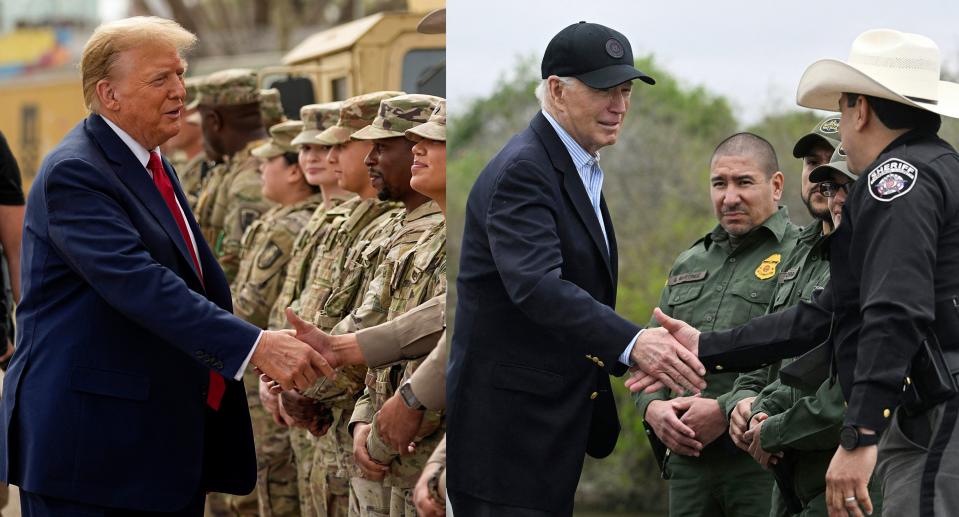
Will Trump, Biden's visits to the border shift the conversation?
No one in the White House, in Congress or on the campaign trail has figured out how to address the pace and swell of modern migration, as people arrive at the U.S. border in record numbers.
Biden has called on Mexico and its regional partners to stem the flow of migrants north. Biden has created new legal pathways to encourage migrants not to cross the border unlawfully. And he’s funneled resources to struggling nations to address the root causes of why people leave.
Trump has proposed more barriers at the border, from razor wire to fences, and mass deportations. Republicans in Congress have proposed sharply restricting access to the U.S. asylum system.
But the flows northward continue at a pace that has been mind-rattling for many Americans. A once-impenetrable jungle connecting North and South America has become a human highway. The Darien Gap between Colombia and Panama is now being trod through by half a million people annually – nearly all of them headed for the U.S. border.
“Nobody has figured out how to deal with this in a short-term way with the existing tools they have,” said Adam Isacson, director for defense oversight at the Washington Office on Latin America. “The most they’ve been able to do is to come up with a small tweak to policies that can push the numbers down for a few months – and then the numbers recover.”
The push-and-pull factors of immigration have proved more powerful than the limited opportunities for legal pathways at the U.S. border and the deterrents of 30-foot fences and razor wire.
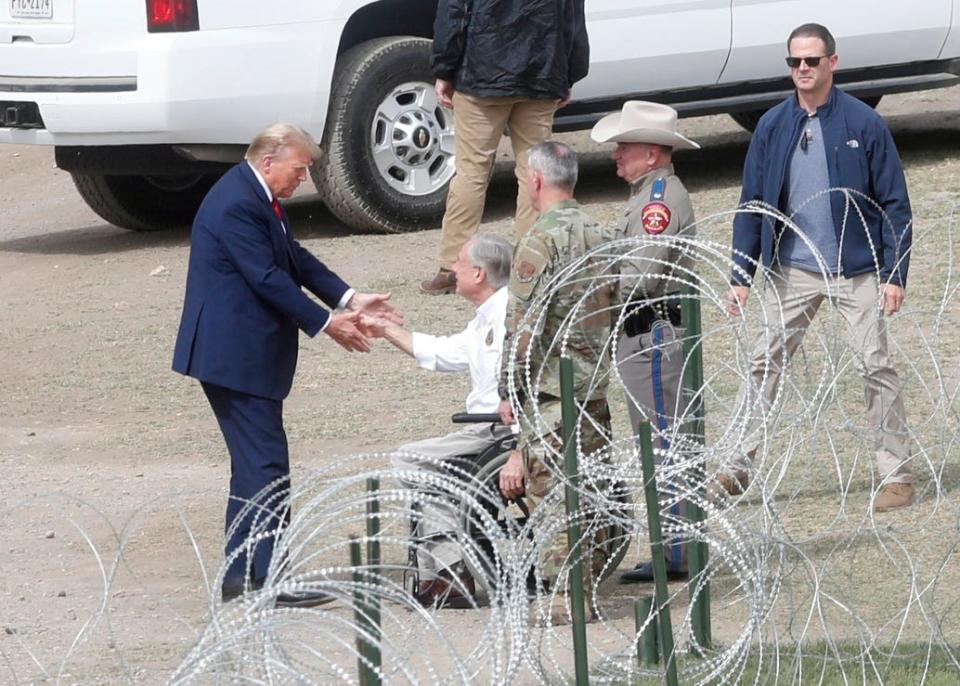
There are more than 9 million job openings in the United States, according to the Bureau of Labor Statistics – a magnet for workers. Meanwhile, countries throughout the hemisphere are still suffering the economic fallout of the pandemic.
“You have the United States in a moment of relative domestic stability with more job openings than workers,” Isacson said. “Throughout the region, you have economies that haven’t crawled out of the crater COVID left. You have repressive governments, climate change and gangs running rampant. You also have a broken U.S. asylum system where you can claim fear and be here for four or five years.”
The number of migrants arriving at the U.S. border dipped in the first year of the Trump administration before climbing again in 2018 and more than doubling in 2019. The COVID-19 pandemic, when travel was restricted across the western hemisphere, depressed migration in 2020 and apprehensions at the U.S. border plummeted.
But as the pandemic waned and regional economies remained in distress, people began heading to the U.S. border in record numbers.
U.S. Customs and Border Protection reported 1.7 million migrant encounters at the Southwest border in fiscal 2021, 2.4 million in fiscal 2022 and an additional 2.5 million in fiscal 2023.
The images of tens of thousands of families crossing the Rio Grande in Texas, or waiting to be received by Border Patrol at the border fence in Arizona or California, have captivated American voters and stoked real worries about the federal government’s ability to quickly vet so many people and the ability of American cities to welcome them.
Abbott has bused more than 100,000 migrants from the Texas border to cities including New York, Chicago and Denver – effectively exporting humanitarian crises to American backyards.
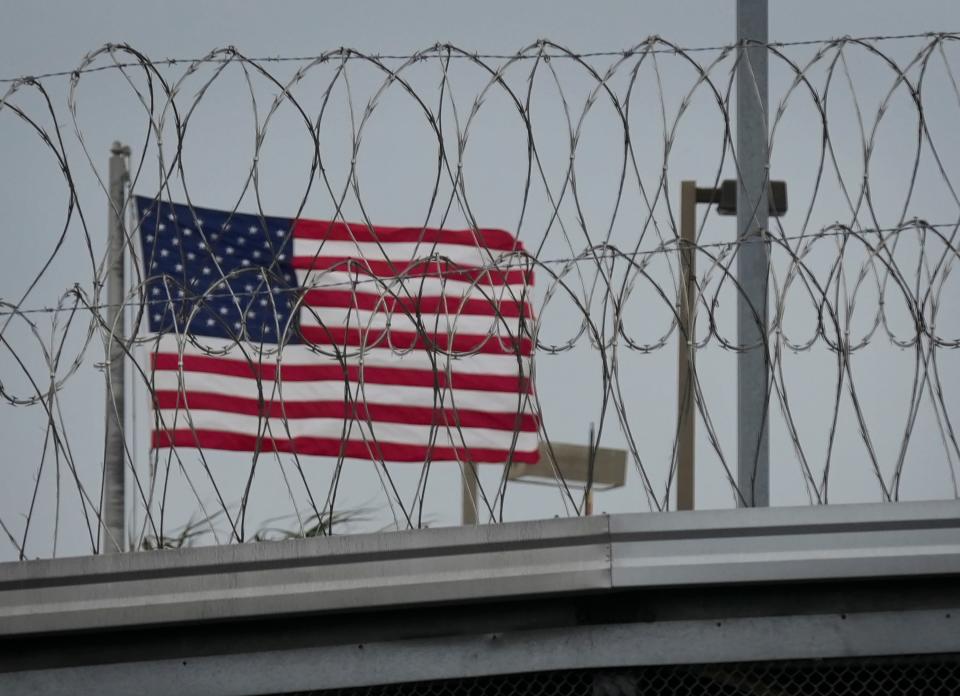
Even before Biden and Trump arrived, a border battle was being waged in a federal court in Texas.
U.S. District Judge David Alan Ezra on Thursday preliminarily prevented Texas from enforcing a law that would make it a state crime to cross the Texas-Mexico border. In his order granting an injunction, Ezra said “states may not exercise immigration enforcement power except as authorized by the federal government.”
Texas’ Senate Bill 4, previously scheduled to take effect March 5, would have allowed state law enforcement officers to arrest, detain and deport individuals suspected of illegally crossing the Texas-Mexico border.
“Surges in immigration do not constitute an ‘invasion’ within the meaning of the Constitution, nor is Texas engaging in war by enforcing SB4,” Ezra said in the order.
“To allow Texas to permanently supersede federal directives on the basis of an invasion would amount to nullification of federal law and authority – a notion that is antithetical to the Constitution and has been unequivocally rejected by federal courts since the Civil War,” he said.
Contributing: Deborah Berry, Swapna Venugopal and The Associated Press
This article originally appeared on USA TODAY: Trump and Biden at the border: How the dueling visits played out
